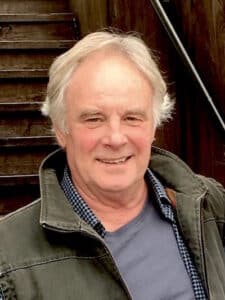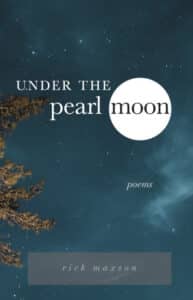Rick Maxson reminds us of why we read poetry
I’ve lived in five cities, of varying size, in my life: New Orleans (born and raised); Baton Rouge (college); Beaumont, Texas (first job); Houston, Texas (five years); and St. Louis (44 years and counting). My sense of memory is strongest for New Orleans; for my sense of place, it’s St. Louis. The two cities serve as my bookends, chronologically and in my mind.
I hadn’t given this serious consideration until I read Under the Pearl Moon: Poems by Rick Maxson. Maxson structures his new collection like the physical locations of his life: Ohio, Florida, Spain, California, Colorado, Texas, North Carolina. The poems become part memoir, punctuated by the introduction to each section.

Rick Maxson
I should mention that the stunning introductions by themselves are something of a marvel. What you soon understand is that the poems will tell the story of a life, not only Maxson’s life but your own. In his hands, poetry is more than biography or autobiography; it becomes shared history. You’re not only reminded of people and events in your own life, but you discover he is telling the story of your own life as well as his own.
It’s no mean accomplishment. Few poets can pull this off, and Maxson does it so well that you become partly expectant and partly fearful at the next poem you’ll read. He’s telling his own story, yes, but he’s also telling yours as well.
Read these poems, and you find yourself playing on the floor of your father’s garage workshop, or riding your bike on a brick-paved street. Discover where the tattooed ship on your uncle’s arm might take you (my Navy-veteran uncle had a tattoo as well). Explore new terrain in Florida and realize exactly when you grew apart from your sister.
Or move with your family to Spain, in what may be a last-ditch attempt to save a marriage. Find love and passion in Madrid. Return to the stereotyped apartment block in Ohio. Move to California because it’s unlike anything you’ve experienced before. Discern the photography in a poem. Realize stability in the soil of North Carolina.
Poetry tells the stories of life, and poetry can also tell the stories of death and loss.
Still Life

you dead, arced with flower sprays,
daylight pushed through the stained glass, brushed
itself across white lilies like a canvas of Klee’s.
Man’s time dissolves in ashes, I repeated,
as the sun and the clouds conspired to make
a red pulse over a cross of carnations
and through the veins of the marble floor.
No one planned the wild buttercups in that field.
I brought no bouquet, nor did I kneel, but lay
down in your golden days and painted you to mind,
relieved of all your hidden colors.
Maxson worked as a technical writer for more than 20 years and as a business analyst for Hewlett-Packard. His poems have been published in both How to Read a Poem and How to Write a Form Poem by Tania Runyan, Earth Song: A Nature Poems Experience by Sara Barkat, and The Poetry Foundation’s podcast The Slowdown. He is currently permissions editor for Every Day Poems and a contributor here at Tweetspeak Poetry. He and his wife Carol live in the Texas Hill Country, land of bluebonnets and other wildflowers.
Under the Pearl Moon contains that magic, that poetic magic, that moves you from where and when you’re reading into your own personal memory palace. Rick Maxson reminds me that I know what it is to have a romantic mother, and what comes to mind as you stand in front of a father’s grave. Be prepared to be left undone.
Photo by Pai Shih, Creative Commons, via Flickr. Post by Glynn Young.
How to Read a Poem uses images like the mouse, the hive, the switch (from the Billy Collins poem)—to guide readers into new ways of understanding poems. Anthology included.
“I require all our incoming poetry students—in the MFA I direct—to buy and read this book.”
—Jeanetta Calhoun Mish
- Poets and Poems: Forrest Gander and “Mojave Ghost” - March 27, 2025
- Poets and Poems: Siân Killingsworth and “Hiraeth” - March 25, 2025
- Poets and Poems: Donna Hilbert and “Gravity” - March 20, 2025


Rick Maxson says
Glynn, I am floored by your review. Speechless…almost. I am most happy to see what I have written cause a reader to reflect on similar events and places in their own life. And isn’t that the goal really?
Through my years with Tweetspeak it has been your writing and all the participants here that have helped me move into my own realizations about my life.
Thank you for all you have said above. You continue to inspire.
Bethany R. says
“daylight pushed through the stained glass, brushed
itself across white lilies like a canvas of Klee’s.”
Such a gorgeous image and bittersweet in context.
“In his hands, poetry is more than biography or autobiography; it becomes shared history.”
Interesting what you note here about places you lived, “The two cities serve as my bookends, chronologically and in my mind.” I know what you mean.
Looking forward to reading those introductions you touched on, Glynn, as well as the poetry, of course. I think my copy should be here in a couple days.
Laura Lynn Brown says
Moves, standing at a father’s grave, the mysteries of a family tattoo — all part of my stories, too. Thanks for the poems, Rick, and for the review, Glynn.
Laurie Klein says
What a delicious teaser, Glynn! Stirring images, imperatives, and invitations.
I look forward to reading more of the poems. Bravo Rick!
Rick Maxson says
Thanks Bethany. You always encourage and inspire.
Rick Maxson says
Thank you Laura sharing stories is all part of why we write poetry and otherwise.
Rick Maxson says
Thanks Laurie.